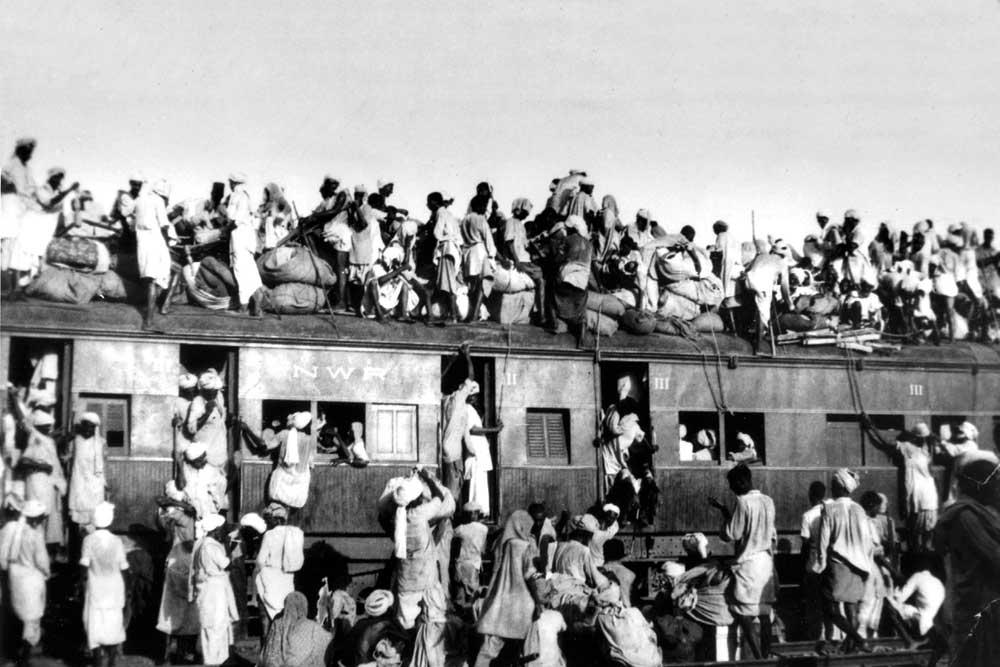CAA - Hypocrisy Knows No Bounds!

इस खबर को अंग्रेजी लेख के नीचे हिंदी में भी पढ़ें।
Historical Context:
- The genesis of the plight faced by minorities in South Asia can be traced back to the divisive ideology propagated by certain Muslim leaders during the pre-partition era.
- Muhammad Ali Jinnah's assertion that Muslims could not coexist harmoniously with Hindus laid the groundwork for the partition of India and the creation of Pakistan.
- This ideological stance sowed the seeds of religious discord and led to the forced migration of millions of Hindus, Sikhs, and other non-Muslims who were once native inhabitants of their lands.
- The brutal violence and persecution unleashed during the partition era forced these minorities to flee their homes and seek refuge elsewhere, including in India.

- Change Over Time:
- Despite assurances of safety and citizenship extended to persecuted minorities by leaders like Mahatma Gandhi and Nehru, the political landscape evolved over time.
- The rise of vote bank politics and the pursuit of electoral gains gradually eclipsed the humanitarian concerns of marginalized communities.
- The plight of refugees and persecuted minorities, though acknowledged in principle, remained largely unaddressed due to the complexities of political expediency and power dynamics.
- Current Situation:
- In response to the enduring suffering of persecuted minorities, the Citizenship Amendment Act (CAA) was enacted by the BJP-led government in 2019.
- The CAA seeks to provide expedited citizenship to persecuted religious minorities, including Hindus, Sikhs, Buddhists, Jains, Parsis, and Christians, who fled from Pakistan, Afghanistan, and Bangladesh due to religious persecution.
- It recognizes the historical injustices faced by these communities and endeavors to rectify them through legislative means.
- Understanding the CAA:
- Importantly, the Citizenship Amendment Act does not alter the process for asylum seekers from across the globe, including persecuted Muslims.
- Individuals facing persecution, irrespective of their religious or ethnic background, can continue to apply for asylum and citizenship through existing legal channels.
- The CAA specifically addresses the unique challenges faced by minorities who were uprooted from their ancestral homes due to religious persecution instigated by the partition based on religious lines.
- Call to Humanity:
- The plight of minorities in Pakistan, Bangladesh and Afghanistan after the partition due to hatred mindset of then Muslim leaders underscores the urgent need for international solidarity and support.
- By recognizing the root causes of persecution and addressing them through legislative measures like the CAA, nations can uphold the principles of justice, equality, and human dignity.
- It is imperative for the global community to stand united against religious intolerance and discrimination, reaffirming its commitment to the fundamental rights and freedoms of all individuals, regardless of their religious affiliation.
In conclusion, the Citizenship Amendment Act represents a significant step towards rectifying historical injustices and ensuring the protection of persecuted minorities in Pakistan, Bangladesh and Afghanistan due to horrific partition of India. By addressing the root causes of religious persecution and offering a pathway to citizenship for those in need, India reaffirms its commitment to the principles of inclusivity, equality, and justice. In a world fraught with division and strife, the CAA serves as a beacon of hope and humanity, reminding us of our shared responsibility to uphold the dignity and rights of all individuals, irrespective of their religious beliefs.
===================================================
दोगलापन की कोई सीमा नहीं!
ऐतिहासिक परिप्रेक्ष्य:
- दक्षिण एशिया में अल्पसंख्यकों के सामने पड़े दुःख का मूल कारण कुछ मुस्लिम नेताओं द्वारा पूर्व-विभाजन काल में प्रसारित विभाजक विचारधारा में ढूंढा जा सकता है।
- मुहम्मद अली जिन्ना का यह दावा कि मुस्लिम हिंदुओं के साथ संगठित रूप से सहज रूप से नहीं रह सकते, भारत के विभाजन और पाकिस्तान की स्थापना के लिए मूल आधार बना।
- इस धार्मिक दृष्टिकोण ने धार्मिक असमंजस के बीज बोए और लाखों हिंदू, सिख, और अन्य गैर-मुस्लिम जिन्हें कभी अपने भूमि के निवासी थे, के द्वारा बलात्कारपूर्वक प्रवास की महज़ुरी की।
- विभाजन काल में हुई बर्बर हिंसा और उत्पीड़न ने इन अल्पसंख्यकों को अपने घरों से भागने और अन्य कहीं शरण ढूंढने के लिए मजबूर किया, भारत में समेत।
- समय के साथ परिवर्तन:
- यद्यपि गांधी और नेहरू जैसे नेताओं ने उत्पीड़ित अल्पसंख्यकों को सुरक्षा और नागरिकता की आश्वासन दिए, लेकिन समय के साथ राजनीतिक दृश्य बदल गया।
- मतदाता बैंक राजनीति और चुनावी लाभ की खोज ने समाज की मानवीय चिंताओं को धीरे-धीरे अवरुद्ध कर दिया।
- शरणार्थियों और उत्पीड़ित अल्पसंख्यकों की दुःखद स्थिति, सिद्धांत में मानी गई होती है, लेकिन राजनीतिक तत्वों और शक्ति के गतिरोध के कारण इसका व्यापक समाधान अभी तक नहीं हुआ है।
- वर्तमान स्थिति:
- उत्पीड़ित अल्पसंख्यकों के दुःख के बावजूद, 2019 में भारतीय जनता पार्टी द्वारा नागरिकता संशोधन अधिनियम (सीएए) को लागू किया गया।
- सीएए का उद्देश्य पाकिस्तान, अफगानिस्तान, और बांग्लादेश से धर्मिक उत्पीड़ित अल्पसंख्यकों को त्वरित नागरिकता प्रदान करना है।
- यह इन समुदायों की ऐतिहासिक अन्यायों को मानता है और उन्हें विधिमान साधनों के माध्यम से सुधारने का प्रयास करता है।
- सीएए को समझना:
- महत्वपूर्ण रूप से, नागरिकता संशोधन अधिनियम विश्व स्तर पर उत्पीड़ित मुस्लिमों समेत सभी विभागों के शरणार्थियों के लिए प्रक्रिया में कोई परिवर्तन नहीं लाता है।
- धर्मिक या जातिगत पृष्ठभूमि के बिना उत्पीड़ित व्यक्तियों को अपने अधिकारों के लिए शरणार्थी और नागरिकता के लिए आवेदन करने की अनुमति दी जाती है।
- सीएए विभाजन के धार्मिक आधार पर अपने पूर्वजों के घरों से उखाड़ने वाले उपलब्धियों के निदान के लिए विशेष रूप से उपलब्धता को पहचानता है।
- मानवता का आह्वान:
- पाकिस्तान, बांग्लादेश और अफगानिस्तान में अल्पसंख्यकों की दुःखद स्थिति जिनके जन्म समय में मुस्लिम नेताओं की नफरत की धारा ने पूरी दुनिया को जोड़ा और समर्थन की आवश्यकता है।
- परिस्थितियों के मूल कारणों को मानकर और सीएए जैसे विधानिक माध्यमों के माध्यम से इन्हें सुधारने के माध्यमों के माध्यम से, देश न्याय, समानता, और मानव गरिमा के मूल्यों को बनाए रखने के लिए विश्व एकजुट होना चाहिए।
- धार्मिक असहिष्णुता और भेदभाव के खिलाफ ग्लोबल समुदाय के लिए एकजुट होना महत्वपूर्ण है, जिससे साफ़ होता है कि सभी व्यक्तियों के धार्मिक अनुभवों के बावजूद, उनके मौलिक अधिकारों और स्वतंत्रता का सम्मान किया जाता है।
संक्षेप में, नागरिकता संशोधन अधिनियम, भारत के भयानक विभाजन के कारण पाकिस्तान, बांग्लादेश, और अफगानिस्तान में उत्पीड़ित अल्पसंख्यकों की इतिहासिक अन्यायों को सुधारने की एक महत्वपूर्ण कदम को प्रस्तुत करता है। धार्मिक उत्पीड़न के मूल कारणों को समझकर और उन्हें सुधारने के लिए नागरिकता की एक राह देकर, भारत मानवता, समानता, और न्याय के सिद्धांतों के प्रति अपनी प्रतिबद्धता को पुनः प्रमाणित करता है। विभाजन और संघर्ष से भरी दुनिया में, सीएए आशा और मानवता की एक प्रेरणास्त्रोत है, हमें हमारी साझी जिम्मेदारी की याद दिलाता है कि हम सभी के धार्मिक विश्वासों के बावजूद, सभी व्यक्तियों की गरिमा और अधिकारों का सम्मान करना है।
- Political Leaders
- Art & Crafts
- Dance & Music
- Sanatan Dharma
- Education & Training
- Food & Drinks
- Gaming
- Health & Fitness
- Home & Gardening
- Literature & Culture
- Love
- Medicine & Ayurveda
- Motors & Vehicles
- Movies & Cinema
- Parenting
- Politics
- Science & Technology
- Shopping
- Social Media
- Spirituality
- Sports
- War & History
- Yoga & Meditation
- Travel & Tourism
- Natural Disaster
- Business & Startups
- DIY & Home Decor
- Finance
- Personal
- News
- Pet Lovers
- Wild Life & Nature
- Podcast & Audio Books
- Poetry
- Law & Order
- Moral Stories
- Jokes & Humour
- Other

